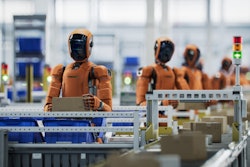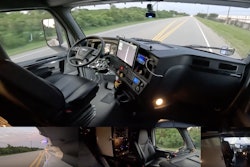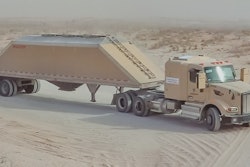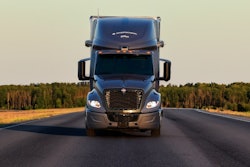Trucking news and briefs for Thursday, Oct. 23, 2025:
Aurora receives warning-device exemption
 Aurora and other autonomous truck companies operating with Level 4 autonomous driving systems can begin using cab-mounted warning beacons as an alternative to reflective triangles to meet federal warning device requirements.Aurora
Aurora and other autonomous truck companies operating with Level 4 autonomous driving systems can begin using cab-mounted warning beacons as an alternative to reflective triangles to meet federal warning device requirements.Aurora
Autonomous truck tech developer Aurora recently announced it has received a waiver from the Federal Motor Carrier Safety Administration to begin using cab-mounted warning beacons as an alternative to reflective triangles to meet federal warning device requirements. FMCSA has not yet published the waiver in the Federal Register.
Aurora noted that the cab-mounted flashing lights indicate when a vehicle is stopped on the side of the road to warn other road users, which is similar to systems used by emergency and construction vehicles. The company touted the warning lights as “a step forward for road safety.”
As a result of receiving the exemption, Aurora said it will be filing to dismiss a lawsuit filed earlier this year against FMCSA after the agency denied an exemption request from Aurora and Waymo from the warning triangle requirement.
According to the waiver posted on FMCSA’s website, the waiver was approved for three months through Jan. 9, 2026. After the three-month period, as long as there is no violation of the violation of the terms and conditions of the waiver or a determination of a safety deficiency by FMCSA, the waiver will be reissued.
While the waiver has been granted to Aurora commercial motor vehicles equipped with a Level 4 Automated Driving System (ADS), FMCSA said the waiver “also extends to any other motor carrier operating CMVs with a Level 4 ADS, provided such motor carrier provides written notification to FMCSA that includes the certifications” specified in the waiver.
Under terms of the waiver, companies operating under the exemption are required to submit a report to FMCSA within 30 days of the end of the waiver that includes information about warning beacon activations and performance.
“History has proven that innovation improves the safety of our nation's roadways,” Aurora said in announcing it had received the waiver. “Aurora is committed to fulfilling our mission to deliver the benefits of self-driving technology safely, quickly, and broadly. As part of that mission and our commitment to transparency, we look forward to continuing work with the federal agencies and federal and state policymakers to improve transportation safety for all commercial vehicles, strengthen our supply chain, and maintain the United States’ technological edge over international competitors.”
Schneider leverages AI to improve efficiency
Schneider National (CCJ Top 250, No. 6) is looking to leverage advanced data and AI-enabled automation to streamline workflows and reduce inefficiencies through a new partnership with data and AI company EXL.
The initiative targets manual processes and frequent hand-offs that create delays in logistics operations, the companies said. Historically, the trucking industry has contended with significant lags in scheduling, with an average of three days passing from load creation to appointment confirmation. By deploying a suite of data and AI technologies, EXL and Schneider have successfully digitized and optimized the entire appointment scheduling workflow, from intake and processing to reporting.
“Embracing digital transformation is key to our mission of providing solutions for our customer and drivers,” said Mike Kukiela, senior vice president, operations supply chain and distribution management at Schneider. “Our collaboration with EXL has delivered measurable impact and set a new benchmark of excellence – both for Schnieder and the trucking industry as a whole.”
As a result of the collaboration, Schneider said it has seen a more than 50% improvement in average cycle time to schedule appointments and a 24% reduction in the cost per appointment scheduled.
The implementation of a cloud-native, 24/7 scalable solution provides near-real-time appointment setting, which greatly enhances both customer and driver experiences.











